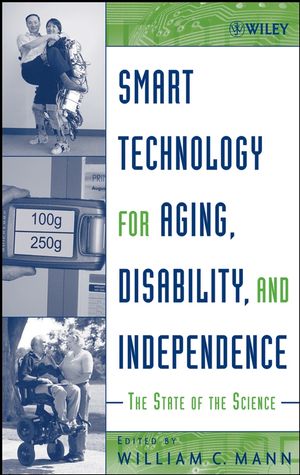Smart Technology for Aging, Disability, and Independence: The State of the ScienceISBN: 978-0-471-69694-0
Hardcover
379 pages
July 2005
 This is a Print-on-Demand title. It will be printed specifically to fill your order. Please allow an additional 10-15 days delivery time. The book is not returnable.
|
||||||
Independent living with smart technologies
Smart Technology for Aging, Disability, and Independence: The State of the Science brings together current research and technological developments from engineering, computer science, and the rehabilitation sciences, detailing how its applications can promote continuing independence for older persons and those with disabilities.
Leading experts from multiple disciplines worldwide have contributed to this volume, making it the definitive resource. The text begins with a thorough introduction that presents important concepts, defines key terms, and identifies demographic trends at work. Using detailed product descriptions, photographs and illustrations, and case studies, subsequent chapters discuss cutting-edge technologies, including:
* Wearable systems
* Human-computer interactions
* Assisted vision and hearing
* Smart wheelchairs
* Handheld devices and smart phones
* Visual sensors
* Home automation
* Assistive robotics
* In-room monitoring systems
* Telehealth
After considering specific high-technology solutions, the text examines recent trends in other critical areas, such as basic assistive technologies, driving, transportation and community mobility, home modifications and design, and changing standards of elder care.
Students and professionals in the rehabilitation sciences, health care providers, researchers in computer science and engineering, and non-expert readers will all appreciate this text's thorough coverage and clear presentation of the state of the science.
Smart Technology for Aging, Disability, and Independence: The State of the Science brings together current research and technological developments from engineering, computer science, and the rehabilitation sciences, detailing how its applications can promote continuing independence for older persons and those with disabilities.
Leading experts from multiple disciplines worldwide have contributed to this volume, making it the definitive resource. The text begins with a thorough introduction that presents important concepts, defines key terms, and identifies demographic trends at work. Using detailed product descriptions, photographs and illustrations, and case studies, subsequent chapters discuss cutting-edge technologies, including:
* Wearable systems
* Human-computer interactions
* Assisted vision and hearing
* Smart wheelchairs
* Handheld devices and smart phones
* Visual sensors
* Home automation
* Assistive robotics
* In-room monitoring systems
* Telehealth
After considering specific high-technology solutions, the text examines recent trends in other critical areas, such as basic assistive technologies, driving, transportation and community mobility, home modifications and design, and changing standards of elder care.
Students and professionals in the rehabilitation sciences, health care providers, researchers in computer science and engineering, and non-expert readers will all appreciate this text's thorough coverage and clear presentation of the state of the science.



